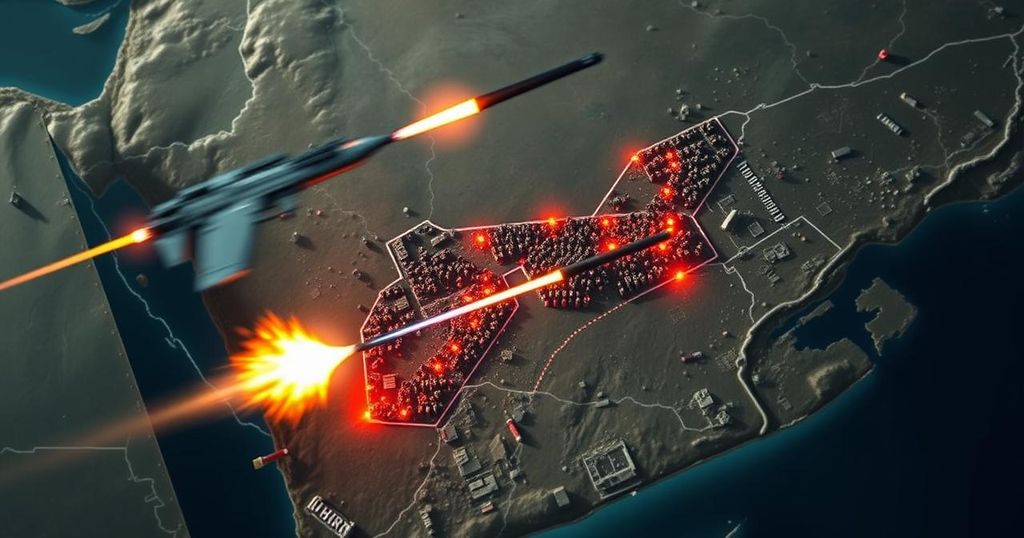U.S. Strikes on Houthis Reflect Escalating Tensions in the Middle East

The U.S. has conducted airstrikes against Houthi targets in Yemen using B-2 bombers for the first time since conflict escalated last year. Concurrently, tensions rise as Israeli forces engage with UN peacekeepers in Lebanon, and the humanitarian situation deteriorates with significant displacement in the region. Ceasefire negotiations in Gaza are stagnating, highlighting a complex geopolitical crisis with urgent humanitarian implications.
On November 2, 2023, the United States conducted airstrikes against the Iran-backed Houthi militant group in Yemen, using B-2 stealth bombers to target five underground weapons storage facilities. This operation marks a significant tactical shift, as it represents the first utilization of this advanced military technology against the Houthis amidst escalating tensions in the Middle East. The strikes were authorized by President Joe Biden and are seen as a measure to curb the Houthis’ capability to threaten U.S. interests and allies, particularly in light of recent hostilities in the region connected to the ongoing conflict involving Israel and Iran. In related developments, Israeli forces engaged with a United Nations peacekeeping position in Southern Lebanon, resulting in damage to a watchtower. Reports indicate that this incident is part of a broader pattern of confrontation, as Israel has reportedly fired upon UN peacekeepers multiple times recently. The situation in Lebanon continues to worsen, with UNICEF indicating that approximately 400,000 children are among the 1.2 million displaced individuals due to ongoing conflict with Hezbollah. Furthermore, the humanitarian crisis is exacerbated by concerns of a cholera outbreak, as the WHO has reported a high risk of spreading the disease. Negotiations for a ceasefire in Gaza have stalled for nearly a month, as confirmed by Qatar’s Prime Minister, who noted a lack of progress from all involved parties. Israel’s Defense Minister criticized France for its decision to prohibit Israeli companies from exhibiting at an upcoming naval show, which he characterized as a disgraceful act against Israel during wartime. The U.S. government’s deployment of the B-2 bombers, combined with statements from Defense Secretary Lloyd Austin indicating a strong stance against aggression towards civilians and allies, signifies a firm message directed towards Tehran, especially considering the ongoing military dynamics involving the Israel-Iran conflict and the larger network of militant groups supported by Iran throughout the region. As the situation unfolds, it is anticipated that Israel’s response to recent Iranian missile strikes will occur prior to the upcoming U.S. elections on November 5, indicating a critical juncture in Middle Eastern geopolitics. Ultimately, the events reflect the urgent need for international diplomacy aimed at addressing the humanitarian crises and preventing further military escalations.
The recent strikes carried out by the United States against the Houthis in Yemen occur within a broader context of heightened tensions in the Middle East, particularly involving the dynamics between Iran and its allied groups. Over the past year, the Houthis have increasingly targeted maritime routes vital for international shipping, raising concerns over regional security. The use of B-2 stealth bombers for these airstrikes represents not only a tactical escalation but also a symbolic message directed towards Iran amid ongoing hostilities with Israel. Additionally, the humanitarian crises in Gaza and Lebanon have drawn international attention, further complicating the geopolitical landscape and necessitating urgent diplomatic efforts to restore ceasefire agreements and address the devastating impacts of conflict on civilian populations.
The U.S. airstrikes against the Houthis in Yemen emphasize the ongoing military and political complexities in the Middle East, marked by escalating tensions between Iran-backed groups and U.S. allies. With humanitarian crises unfolding in Lebanon and Gaza, and stalled negotiations for a ceasefire, the international community faces mounting pressure to facilitate dialogue and find resolutions to these urgent issues. Israel’s anticipated responses to Iranian provocations could further destabilize the region, underscoring the critical importance of addressing both military aggression and humanitarian needs.
Original Source: www.cnn.com








